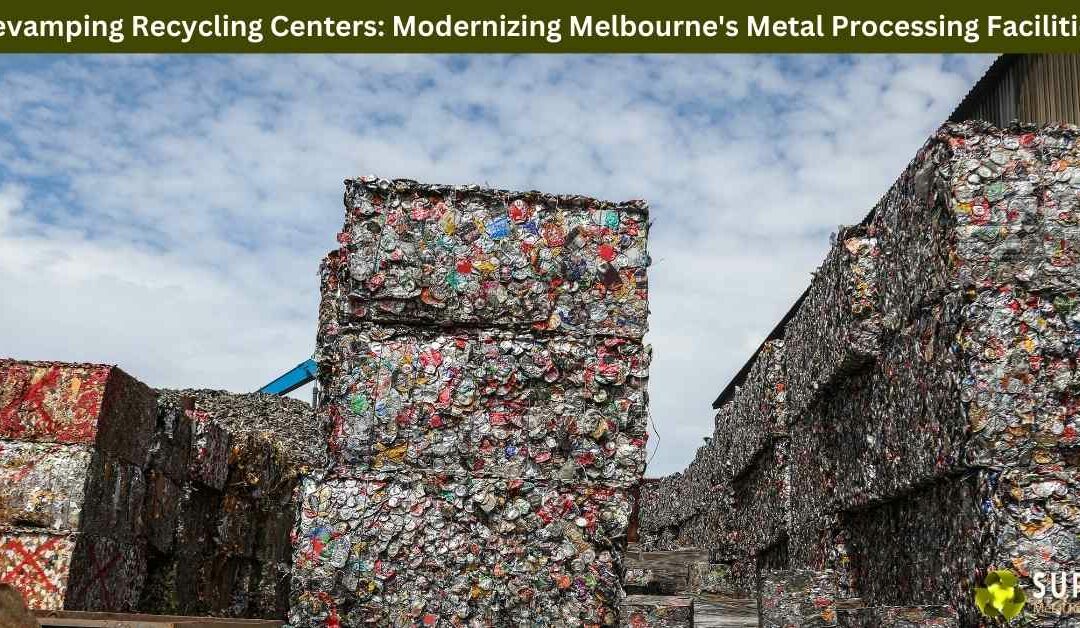Melbourne, renowned for its dynamic culture and forward-thinking approach, is at the forefront of Australia’s efforts to build a sustainable future. A critical aspect of this sustainability drive is the modernization of recycling centers, particularly those involved in metal processing. As the demand for recycled metals grows and technology advances, revamping these facilities is essential to meet the challenges and opportunities of today’s recycling landscape. This blog explores the significance of updating Melbourne’s metal recycling centers and the benefits it brings to the community, the environment, and the economy.
The Imperative for Modernization
Metal recycling is a cornerstone of sustainable waste management. It conserves natural resources, reduces greenhouse gas emissions, and decreases energy consumption compared to producing metals from virgin ores. However, as the volume and complexity of recyclable materials increase, traditional recycling centers face significant challenges in processing efficiently and effectively.
- Increased Volume and Complexity: The influx of diverse metal waste, from household items to industrial machinery, demands more sophisticated sorting and processing capabilities. Modernization is essential to handle this growing and varied input.
- Technological Advances: Innovations in recycling technology offer the potential for more efficient processing, higher recovery rates, and reduced operational costs. Upgrading facilities to incorporate these technologies is crucial to stay competitive and environmentally responsible.
- Regulatory and Environmental Standards: Stringent regulations and growing environmental awareness necessitate the adoption of cleaner, safer, and more efficient recycling practices. Modern facilities can better meet these requirements, minimizing their ecological footprint and improving worker safety.
Key Areas for Modernization
Revamping recycling centers involves several key areas of focus, from technological upgrades to operational efficiencies and enhanced community engagement.
1. Advanced Sorting and Processing Technologies
Modern recycling centers leverage cutting-edge technologies to enhance their sorting and processing capabilities:
- Automated Sorting Systems: Automated systems using sensors, such as near-infrared spectroscopy and X-ray technology, can quickly and accurately sort metals by type and purity. This reduces manual labor and increases throughput.
- Shredding and Granulating Equipment: Advanced shredders and granulators break down large metal items into smaller, manageable pieces, facilitating easier handling and further processing.
- Electrostatic Separation: This technology separates metals based on their electrical conductivity, allowing for the efficient extraction of valuable metals from mixed materials.
- Chemical and Thermal Processing: Modern chemical and thermal treatments can recover metals from complex products, such as electronic waste, with higher efficiency and lower environmental impact.
2. Energy Efficiency and Sustainability
Modernizing facilities with energy-efficient equipment and sustainable practices is critical for reducing operational costs and environmental impact:
- Renewable Energy Integration: Utilizing solar panels, wind turbines, or bioenergy systems to power recycling centers can significantly reduce their carbon footprint.
- Heat Recovery Systems: Implementing systems to capture and reuse heat generated during metal processing can improve overall energy efficiency.
- Water Recycling and Treatment: Advanced water treatment technologies can recycle water used in the processing stages, minimizing waste and reducing the demand for fresh water.
3. Digitalization and Data Management
Incorporating digital technologies into recycling operations enhances efficiency and transparency:
- IoT and Smart Sensors: Internet of Things (IoT) devices and sensors can monitor equipment performance, material flow, and environmental conditions in real-time, enabling proactive maintenance and process optimization.
- Data Analytics: Advanced data analytics can optimize sorting and processing operations, predict maintenance needs, and provide insights into material recovery rates and market trends.
- Blockchain for Traceability: Blockchain technology can ensure the traceability and authenticity of recycled metals, providing valuable information for consumers and businesses about the origin and processing of recycled materials.
4. Community Engagement and Education
Modern recycling centers play a crucial role in educating and engaging the community:
- Educational Programs: Offering tours, workshops, and informational sessions can raise awareness about the importance of recycling and the capabilities of modern facilities.
- Partnerships with Local Businesses: Collaborating with local businesses to provide recycling services and promote sustainable practices strengthens community ties and increases the volume of recyclable materials processed.
- Public Reporting and Transparency: Regularly publishing data on recycling rates, environmental impact, and operational improvements fosters trust and demonstrates the facility’s commitment to sustainability.
The Benefits of Modernization
Revamping Melbourne’s metal recycling centers brings a host of benefits:
- Economic Growth: Upgraded facilities can process more materials efficiently, leading to increased revenue and job creation. They also attract investment in the local economy through partnerships and technology adoption.
- Environmental Protection: Modernized centers reduce the environmental impact of metal processing by decreasing energy consumption, minimizing waste, and lowering emissions.
- Community Engagement: Enhanced community programs and transparent operations build public trust and encourage greater participation in recycling initiatives.
- Operational Efficiency: Advanced technologies and optimized processes reduce operational costs, improve material recovery rates, and increase the overall sustainability of the facility.
Moving Forward
As Melbourne continues to grow and evolve, so too must its recycling infrastructure. Investing in the modernization of metal processing facilities is not just a necessity but an opportunity to position Melbourne as a leader in sustainable practices. By embracing technological advancements, enhancing operational efficiencies, and fostering community engagement, Melbourne’s recycling centers can set a benchmark for the rest of the world.
Conclusion
The journey towards modernizing Melbourne’s metal recycling centers is both challenging and rewarding. It requires a collective effort from government bodies, businesses, and the community to realize the full potential of these facilities. As we revamp these centers, we pave the way for a greener, more sustainable future, where the value of our resources is maximized, and our environmental impact is minimized.
If you are in Malvern East, Victoria 3145, and looking for a metal recycling service, this is the best way to visit us.
Super Metal Recycling
345 Frankston – Dandenong Road, Dandenong South VIC 3175
(03) 9706 4909


Recent Comments